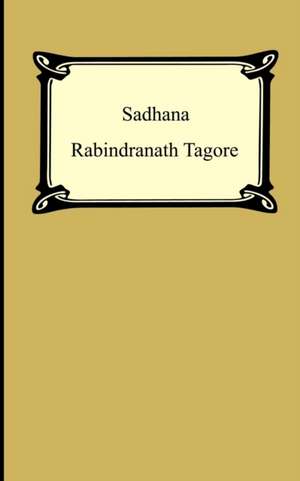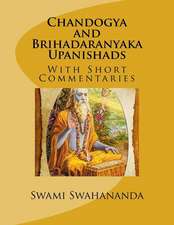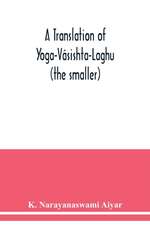Sadhana
Autor Rabindranath Tagoreen Limba Engleză Paperback – 31 dec 2004
Preț: 75.73 lei
Nou
Puncte Express: 114
Preț estimativ în valută:
14.49€ • 15.13$ • 11.99£
14.49€ • 15.13$ • 11.99£
Carte tipărită la comandă
Livrare economică 01-07 aprilie
Preluare comenzi: 021 569.72.76
Specificații
ISBN-13: 9781420926545
ISBN-10: 1420926543
Pagini: 84
Dimensiuni: 127 x 203 x 5 mm
Greutate: 0.1 kg
Editura: Digireads.com
ISBN-10: 1420926543
Pagini: 84
Dimensiuni: 127 x 203 x 5 mm
Greutate: 0.1 kg
Editura: Digireads.com
Descriere
Written by Nobel Prize Laureate Rabindranath Tagore and available in paperback for the first time, "Sadhana" is a profound, highly accessible introduction to India's ancient spiritual heritage. Few figures in history have been as important as Rabindranath Tagore in bringing Indian philosophy and spiritual teachings to the West.
Notă biografică
¿ Rabindranath Tagore, was a polymath, poet, musician, and artist from the Indian subcontinent. He reshaped Bengali literature and music, as well as Indian art with Contextual Modernism in the late 19th and early 20th centuries. Author of the "profoundly sensitive, fresh and beautiful verse" of Gitanjali, he became in 1913 the first non-European to win the Nobel Prize in Literature.[7] Tagore's poetic songs were viewed as spiritual and mercurial; however, his "elegant prose and magical poetry" remain largely unknown outside Bengal.[8] He is sometimes referred to as "the Bard of Bengal".[9] ¿ A Brahmo Hindu from Calcutta with ancestral gentry roots in Burdwan District[10] and Jessore, Tagore wrote poetry as an eight-year-old.[11] At the age of sixteen, he released his first substantial poems under the pseudonym Bh¿nusi¿ha ("Sun Lion"), which were seized upon by literary authorities as long-lost classics. By 1877 he graduated to his first short stories and dramas, published under his real name. As a humanist, universalist, internationalist, and ardent anti-nationalist, he denounced the British Raj and advocated independence from Britain. As an exponent of the Bengal Renaissance, he advanced a vast canon that comprised paintings, sketches and doodles, hundreds of texts, and some two thousand songs; his legacy also endures in the institution he founded, Visva-Bharati University. ¿ Tagore modernised Bengali art by spurning rigid classical forms and resisting linguistic strictures. His novels, stories, songs, dance-dramas, and essays spoke to topics political and personal. Gitanjali (Song Offerings), Gora (Fair-Faced) and Ghare-Baire (The Home and the World) are his best-known works, and his verse, short stories, and novels were acclaimed-or panned-for their lyricism, colloquialism, naturalism, and unnatural contemplation. His compositions were chosen by two nations as national anthems: India's Jana Gana Mana and Bangladesh's Amar Shonar Bangla. The Sri Lankan national anthem was inspired by his work


